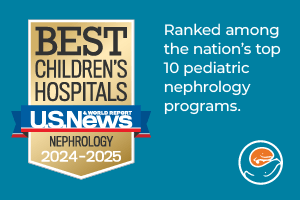Kidney Failure
What is kidney failure?
Kidney failure, also called end-stage renal disease (ESRD), is when the kidneys no longer remove wastes from the blood or control salts in the body.
-
When does kidney failure happen?
Kidney failure occurs when the kidneys cannot function at a level that supports life. It usually happens when kidney function is less than 10% of normal.
-
Are there different types of kidney failure?
Kidney failure can be sudden (acute) or ongoing (chronic). Acute kidney failure can be caused by an injury or poisoning. Chronic disease usually develops slowly.
-
How serious is kidney failure?
At 10% function, the kidneys develop severe problems. Without dialysis or a kidney transplant, fluid and waste products build up in the body. Kidney failure can be fatal if not treated.
-
What causes kidney failure in children?
Several conditions or diseases can cause kidney failure in children, including:
- Kidney and bladder defects that a child is born with (congenital)
- Hereditary diseases such as congenital nephrotic syndrome, polycystic kidney disease and cystinosis
- Reflux and infections
- Glomerulonephritis, which attacks the structures in the kidneys that filter blood
- Nephrosis, which occurs when large amounts of protein leak into the urine, leaving low levels in the blood
- Poisoning
- Allergic reaction to a drug
- Tumors
Symptoms of Kidney Failure
Your child might not show any symptoms of a problem with their kidneys until the kidneys are not doing their job and fail to remove waste from the blood.
When the kidneys are not working well, symptoms vary. Symptoms might look the same as many other conditions. These symptoms include:
- Urinating more often or less often
- Feeling very tired
- Losing appetite
- Getting sick to the stomach or vomiting
- Having swelling in hands or feet
- Feeling itchy or numb
- Having darkened skin
- Having muscle cramps
Kidney Failure Care at Seattle Children's
For more than a decade, our Nephrology Program has been among the top 10 pediatric nephrology programs in the nation, which means your child will be cared for by the very best.
Diagnosing Kidney Failure
Some ongoing kidney problems do not have obvious symptoms. Your child’s doctor might find a kidney disorder during a routine check-up or exam. If your child’s doctor suspects there might be a problem with the kidneys, they may check:
- Your child’s blood pressure. High blood pressure can be a sign that the kidneys are not working well.
- The amount of a protein called albumin in your child’s urine. Healthy kidneys filter wastes from the blood but leave protein in the blood. Protein in the urine can be a sign of kidney trouble.
- The amount of a waste product called creatinine in your child’s blood. Healthy kidneys usually filter creatinine out of the blood.
Treating Kidney Failure
Treatments for kidney failure are dialysis or kidney transplant. Your child’s doctor will talk with you about what treatment might be best for your child based on their health and condition.
- Children with sudden (acute) kidney failure sometimes need dialysis treatments until their kidneys start to work again.
- Children with ongoing (chronic) kidney failure need dialysis or a kidney transplant.
Learn about dialysis at Seattle Children’s.
For more information on kidney transplants at Seattle Children’s, read What to Expect If Your Child Needs a Kidney Transplant.
-
Supporting your child’s health
We offer other treatments along with dialysis or transplant to help support and improve your child’s health. Depending on your child’s needs, we may:
- Limit the amount of fluids your child gets to match the amount of urine they produce.
- Recommend a low-protein diet and restrict your child’s use of salt to help slow the build-up of wastes in their blood. • Prescribe drugs to keep calcium and phosphorus in good balance and slow bone disease.
- Give your child iron and a synthetic hormone called erythropoietin to help make red blood cells if your child has fewer red blood cells than normal in their blood (anemia). Your child may take these in a pill or get them through an IV. Your child might need blood transfusions if they don’t respond to these medications or are so anemic that there is not time for the medicines to work.
- Recommend growth hormone for children who are not growing at a typical rate because of kidney disease. Your child would get this medicine as a shot every day.
- Control high blood pressure with medicines.
Kidney Failure at Seattle Children’s
 U.S. News & World Report has recognized Seattle Children’s as one of the top 10 best children’s hospitals in the U.S. and the best in the Pacific Northwest.
U.S. News & World Report has recognized Seattle Children’s as one of the top 10 best children’s hospitals in the U.S. and the best in the Pacific Northwest.
Seattle Children’s consistently ranks among the top 10 kidney transplant centers in the United States for children based on the number of transplants we perform. We are among the top 5 in transplanted kidney (graft) survival rates. We have been treating kidney failure in children since 1984.
-
We are committed to excellent results
We are always improving how we use medicines, dialysis management and transplant surgery techniques to provide the most current treatments and the very best care for your child.
-
The experts you need are here
Our team is led by Dr. Patrick Healey, division chief of Transplantation, and Dr. Ruth McDonald, medical director of Solid Organ Transplant. Our kidney specialists (nephrologists) are experts in kidney disease in children. They publish findings in medical journals around the world. Our transplant providers lead and participate in regional and national organizations and research programs focused on kidney disease in children.
We are committed to recruiting and retaining the best transplant specialists. As a teaching hospital, we train tomorrow’s doctors and researchers in children’s kidney disorders. Our pediatric nephrology fellowship program – one of a handful in the United States – attracts the best and brightest young doctors from around the world.
-
Research to improve care
We continue to advance the practice and understanding of transplants through our research programs. Our top research priority is finding a way for children who have a transplant to be less dependent on antirejection drugs.
Learn more about our kidney transplant research and clinical studies.
Contact Us
Contact Nephrology at 206-987-2524 for a referral, second opinion or more information.


